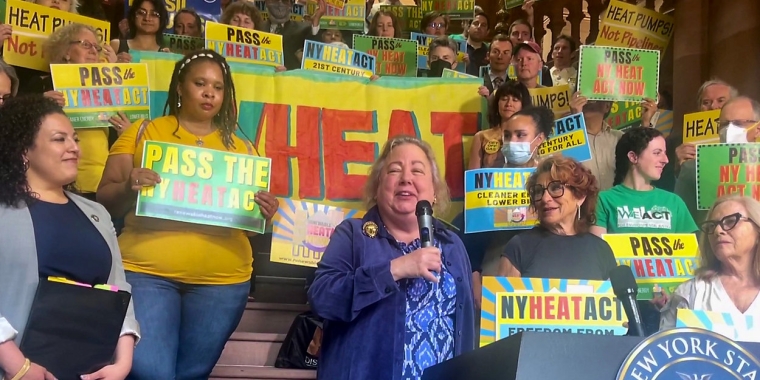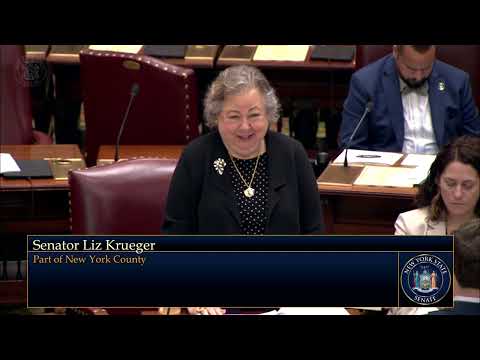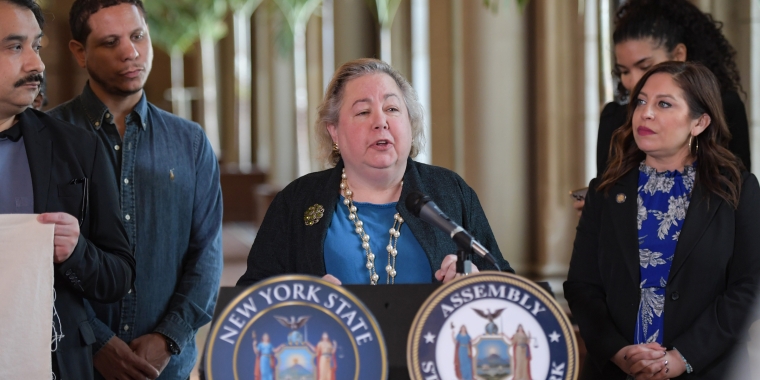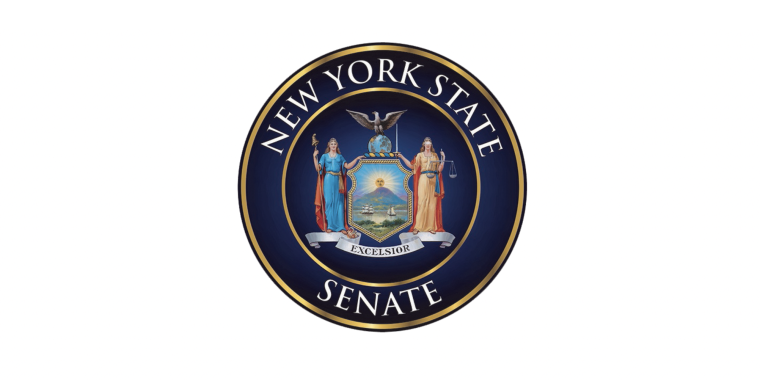
Senator Liz Krueger Announces Reintroduction of NY HEAT Act
February 3, 2025

Albany – Today, State Senator Liz Krueger announced the reintroduction of the New York Home Energy Affordable Transition Act, or NY HEAT Act. The bill, which passed in the Senate the last two years and a version of which was included in the governor's Executive Budget last year, is a critical piece of affordability and climate legislation that would align state utility laws with the climate mandates in the CLCPA, ending New York's gas mandate and forced ratepayer subsidies for gas expansion, so that utilities can make smarter, more cost-effective investments to ensure an affordable, reliable, and equitable transition to a cleaner future.
NY HEAT would save ratepayers billions of dollars every year on avoided gas infrastructure costs, help households transition away from dirty and expensive methane gas, and facilitate the attainment of the Public Service Commission's goal of protecting residential customers from paying more than 6% of their household income for energy bills, which could save 25% of all New York households - those that struggle the most to afford their energy bills – an average of $136 each month, cutting bills nearly in half.
“This session, the Legislature has two imperatives – address the affordability crisis for regular New Yorkers, and protect the progress our state has made on critical priorities in the face of Donald Trump’s attempts to send us back to the 19th century," said Senator Krueger. "NY HEAT achieves both of those goals: it will save ratepayers billions of dollars every year and will make significant progress toward our climate goals at a time when we’re risking stagnation or worse. The status quo of our utility gas system is expensive, old, leaky, cold, and dangerous. Repairing and replacing the system, not to mention expanding it, is driving rate increases around the state. NY HEAT will save ratepayers money while providing modern heating, cooling, and cooking options that work better and don’t endanger the health and safety of New York families.”
As of September 2024, approximately 1 in 7 households in New York were two months or more behind on their energy bills. This crisis is impacting more than 1.2 million families, who are collectively in debt more than $1.3 billion dollars to utilities, which are projected to charge New Yorkers 18% more for heat this winter, even though the price of gas itself is going down.
The Home Energy Affordable Transition Act, also known as the NY HEAT Act, will stop the expansion of New York's outdated and dangerous fracked gas system, saving all ratepayers billions of dollars every year, and saving the 1 in 4 New Yorkers who struggle to pay their energy bills an average of $136 every month.
The gas system status quo is both unaffordable and bad for the climate. Currently, ratepayers are forced to subsidize expansion of the gas system, spending over $200 million each year because of the "100-foot rule." Every new mile of gas pipeline costs an average of $3-$6 million – $60,000 per customer on that line – all subsidized by existing ratepayers. NY HEAT will end those subsidies.
The NY HEAT Act will also free New Yorkers from the gas mandate (also known as "the utility obligation to serve gas"), an antiquated state law that locks utilities, and consequently the vast majority of New Yorkers, into the dirty, expensive, aging gas system for heat. Because of the gas mandate, a single home that wants to stay on the gas system can prevent an entire neighborhood from having the opportunity to receive cheaper, cleaner heating alternatives from their utility. The NY HEAT Act would require utilities to provide easy access to the most affordable and healthier heating options for their families.
Ratepayers are also on the hook for $150 billion in coming years to replace leak-prone pipes, an average of $35,000 for every gas customer in the state, installing infrastructure that must be phased out in less than 30 years. Under a recent three-year rate agreement announced by National Grid, customers in New York City and Long Island would see their gas bills increase by an average of nearly $30 per month in the first year, $14 per month in the second year, and about $20 per month in the third year. These rate increases are driven in part by nearly $5 billion in spending on new gas infrastructure. NY HEAT will end this wasteful spending.
By curbing expansion of the fracked gas system, the NY HEAT Act will also curb the utility rate hikes slamming New Yorkers across the state:
- After National Grid's latest 36% rate hike that began in September 2024, NYC and Long Island customers heating their homes with gas will pay $60 more per month on average by April 2026.
- As of this month, the average ConEd gas and electric customer will pay over $50 more per month.
- By the end of 2026, NYSEG customers in the Southern Tier will be forced to pay up to $40 more every month for gas and electricity than they did in 2023, and RG&E customers will see an average total monthly bill increase of $30.16.
- After hiking rates in July 2024 with the average Central Hudson customer paying an extra $30 every month for gas and electric bills, CenHud is now seeking another rate hike that would raise the average bill another $18.
- In December 2024, Governor Hochul's Public Service Commission approved National Fuel Gas's rate hike, increasing bills by $17, with average gas bills nearing $100.
- If O&R's proposal is approved by the State, Rockland County gas and electric customers will see an increase of 10% on their bills.
Pro-climate legislation that saves New Yorkers money is popular: 67% of Democrats, 47% of Republicans, and 55% of independents agreed the NY HEAT Act should have passed last session. The bill was also popular with 60% of upstate voters, 55% of union households, and across income groups. 74% of Black voters and 70% of Latino voters also wanted it to pass.
State action against climate change is crucial with Trump in office and vowing to go all-in on fossil fuels. 2024 was the hottest year on record, and New Yorkers experienced wildfires, flooding, and tornadoes. The NY HEAT Act will help New York fight climate change and protect New Yorkers from an unpredictable Trump administration by helping to stabilize heat and energy costs.
Responding to concerns from legislators last session, the reintroduced bill has been streamlined and clarified to achieve the same goals while also creating explicit protections for gas customers during the long-term transition of the utility gas system. The bill now outlines a process for implementation that ensures transparency and thorough planning, as well as notice, support, and protections for transitioning customers. This process involves:
- A Statewide Affordable Gas Transition Plan, developed by the Public Service Commission within two years of the effective date of the bill.
- Utility Home Energy Affordable Transition (HEAT) Programs, developed within one year of the completion of the Transition Plan, to implement Neighborhood Gas Transition Projects.
- Neighborhood Gas Transition Projects to decommission segments of the gas system and transition customers to affordable, reliable, comfortable, and clean alternatives like thermal energy networks.
- New explicit protections for transitioning customers include:
- No existing residential customer will be transitioned as part of a Neighborhood Gas Transition Project until 2030 at the earliest.
- A guarantee of continued access to safe and reliable energy services for heating, cooling, cooking, and water heating.
- Access to funding and technical support for the installation of customer-owned equipment at low or no cost.
- At least two years advance notice prior to transitioning.
- Opportunity to comment on the Neighborhood Gas Transition Project covering their area before they are finalized.
related legislation
Share this Article or Press Release
Newsroom
Go to NewsroomTREES Act Passes Both Houses Of The Legislature
May 16, 2024



